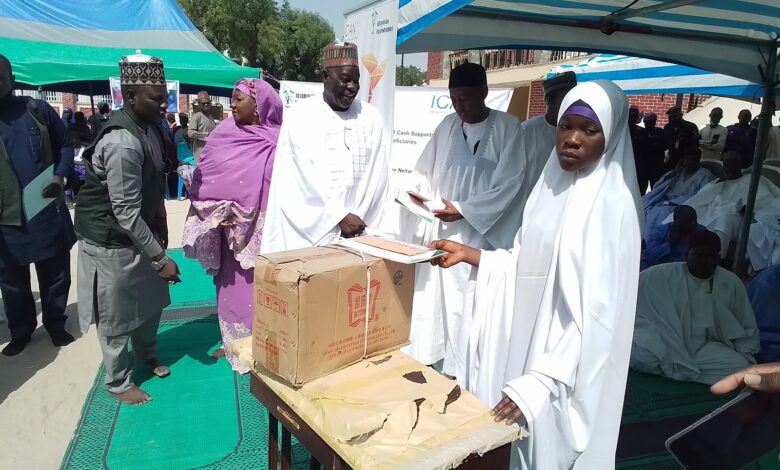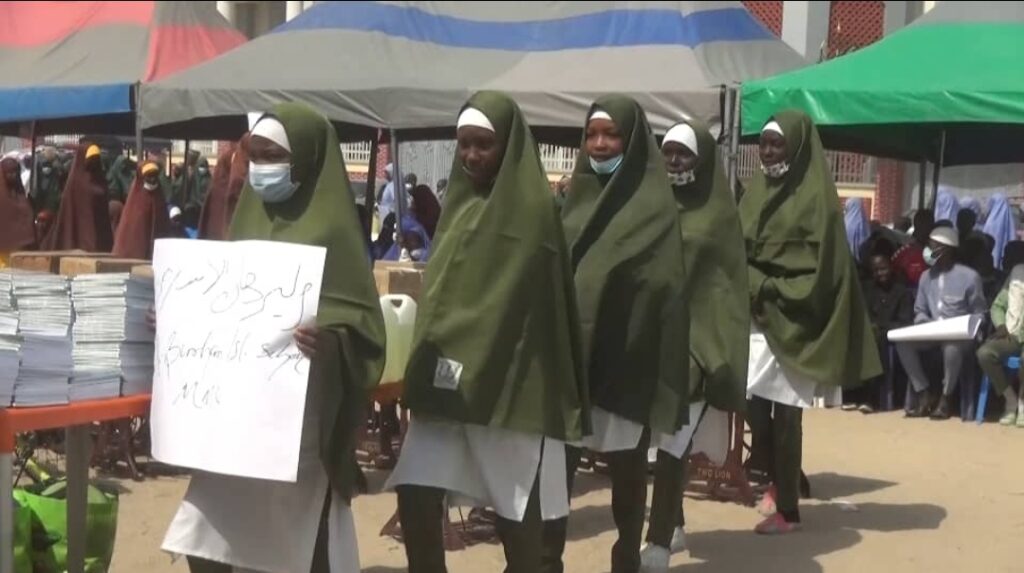
About 10,000 students of Quranic schools in Borno State, Northeast Nigeria, have been trained as peace ambassadors through alternative Quranic teaching to counter narratives of violent extremism.
The initiative is being promoted locally in Borno as one of its homegrown solutions towards halting the menace of the religious extremism that has afflicted the state.
The selected Quranic students who underwent a three weeks intensive coaching in December 2022, were graduated on Monday, Jan. 2, 2023 at an elaborate event in Maiduguri, capital of Borno state, northeast Nigeria.
Allamin Foundation, a Borno-based civil society and a nongovernmental organisation known for promoting the rights of women and vulnerable groups in conflict situations, presented certificates and awards to the graduates of the youth-centric peace programme at a brief ceremony held in Maiduguri, the state capital.
Chief executive of Allamin Foundation, Hamsatu Allamin, informed HumAngle that 1000 graduates were initially trained under a counter-narratives programme codenamed Boko-Halal (meaning western education is acceptable), which is a contrasting coinage to Boko Haram (which translates to Western education is prohibited).
The NGO, two years ago, published and launched a contemporary Islamic Education teaching manual which was freely distributed to selected Qur’anic schools to be used as a teaching model in school children.
“The teaching manual is a fusion of western peacebuilding concepts and that of Islamic education,” she said.
Allamin says the detailed manual, titled Boko Halal: Manual of Peace Education – Teaching Tolerance, Peace and Peaceful Co-Existence and Running Peace Clubs in Islamic Schools,’ was a “product-intensive research by Islamic scholars that has explained many misconceptions of the Islamic teachings, especially in what our people perceived and conceived as western and termed Haram.” These things are not only compatible, they say, but in consonant with Islamic principles.
“Therefore, we took this well-researched message to the children of Islamic schools where many of the students have been lost to the insurgency due to misguidance. The essence of the programme was to target children at a young age to inculcate the Islamic culture of peace and tolerance at an early age so that they would grow with it as future leaders.”
The chief executive officer of the Foundation stressed that it was for want of deeper knowledge and understanding of the true teachings of the Islamic principles of peace and tolerance that many youths, especially those in Quranic schools, had slid into the Boko Haram and ISWAP terrorist groups.
“Since the inception of this programme two years ago, we have recruited 100 Islamic teachers to train 1000 Qur’anic students across different schools,” she said.

“These 1000 students who had graduated sometime last year were mandated to train 10 other students in their schools by down-stepping the counter-narrative knowledge to them. And so far, the students have succeeded in doing that and so far we have a total of 10,000 peace ambassadors and advocates of countering the negative narratives of the violent extremists.”
The programme expects the 10,000 young scholars to deploy to their various locales and communities to disseminate these non-violent approaches to Islamic evangelism to neutralise any existing teachings that usually trigger extreme religious beliefs and violence.
Incentives for committed peace advocates
As a way of encouraging the young moderate communicators of Islamic teachers, the NGO incentivised outstanding performance of the students during their step-down from the knowledge programme.
Some of the outstanding students received economic empowerment items like sewing machines, grinding mills, bicycles, and cash support.
The Shehu of Borno, Abubakar Garbai Allamin Elkanemi, a foremost traditional and religious leader in the Lake Chad region, who supervised the graduation ceremony that was held at his palace commended the students for their courage.
He said Borno State is a centre of Quranic teaching and has been known for its decades of peace until when some non-natives with a skewed understanding of the Islamic culture and traditions came with their alien pedagogy.
“I commend the foresight of the organisers of this life-saving programme which I’m confident will help us to secure our culture as peace-loving Islamic communities in the future,” he said.
The young peace ambassadors
Some of the best-performing students in separate interviews with HumAngle noted their readiness to promote the positive narratives of Islam to counter any harmful portrayals of the faith.
Zainab Mohammed-Kabir, a 17-year-old student from Salmanu Madrasatul Tahfizul Qur’an Islamiyya, who topped her class in the practical tests, said she was happy with the sewing machine, tailoring accessories, and cash rewards she received.
“I did not expect a reward of this nature when I signed to volunteer as a peace ambassador for the youth,” she said.
“We have lost dear ones and family members to the Boko Haram violence, and I felt like talking to my peers about the correct teachings of Islam that peace and being tolerant and good neighbourliness will prevent such horror from continuing in our society.”
Mohammed Abdullahi, a 14-year-old pupil who also outperformed his peers during the coaching sessions said he had downstepped the peace knowledge to ten other pupils in his community, Zabarmari, in Jere Local Government Area (LGA) of Borno State.
“I want to continue speaking and teaching my friends in school and in our street about the message of peace. Some of my friends have lost their fathers because Boko Haram killed them in their farms in Zabarmari,” he said.
“They are not happy now because their father is no more. So if we all can preach peace and get more knowledge about Islam, no one will have to die in violence.”
HumAngle learnt that the peace programme is being funded by the International Civil Society Action Network (ICAN), which is an international NGO known for promoting women’s right, peace and security.
Support Our Journalism
There are millions of ordinary people affected by conflict in Africa whose stories are missing in the mainstream media. HumAngle is determined to tell those challenging and under-reported stories, hoping that the people impacted by these conflicts will find the safety and security they deserve.
To ensure that we continue to provide public service coverage, we have a small favour to ask you. We want you to be part of our journalistic endeavour by contributing a token to us.
Your donation will further promote a robust, free, and independent media.
Donate HereStay Closer To The Stories That Matter




